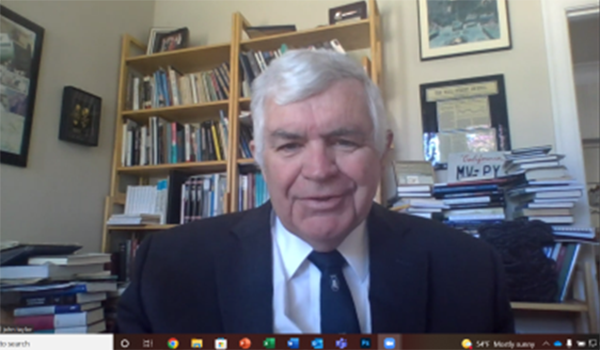Monetary policy has strayed away from a rules-based approach, resulting in a big gap between where rules-based policy would have guided policymakers on interest rates compared to the small rate changes they have actually enacted in the last two years, says John B. Taylor, the Raymond Professor of Economics at Stanford University and George P. Shultz Senior Fellow in Economics at the Hoover Institution. He spoke in the Lubar School of Business Bradley Distinguished Lecture Series.
Taylor is “father” of the Taylor Rule, a forecasting model that suggests how central banks should change interest rates to account for inflation and other economic conditions.
“Unless more sensible monetary policy actions are taken, we will be entering an era of high inflation,” he said.
With the exception of rising inflation, Taylor described a “remarkable economic recovery” from the worst days of the pandemic, pointing to a return to pre-Covid unemployment levels, strong U.S. GDP growth, and a rebounded global economy.
But other measures, he says, demonstrate that the Federal Reserve is being “too accommodative,” pointing to significant growth in the money supply and “well above normal” growth in the federal government’s purchases of Treasury notes and mortgage-backed securities.
That accommodation is represented most notably by the federal funds rate, which had been cut to nearly 0% during the economic slump, with only very recent action to start raising it, he said. “It’s still well below 1% — there’s a way to go.”
Though changes are beginning, the Fed’s projections for the federal funds rate remain significantly “behind the curve,” as they have for at least a year, Taylor noted. “There’s no question that the deviation of the actual interest rates from the rules is very clear. People are increasingly concerned because it’s more apparent that there’s an issue.”
“Making changes now will greatly reduce the chances of a large, damaging change later,” Taylor shared. “A new era of high inflation is sure to happen unless monetary policy changes to control inflation by methods that we have been studying for years.”
He suggested that central banks across the world – not just in the United States – need to start now on rules that markets know and understand, whether that’s the Taylor Rule or an updated rule. Under a rules-based approach, he said, the interest rate will increase if inflation rises.
Ultimately, Taylor said that real economic freedom requires that there is a predictable policy framework within the rule of law – a strategy or a framework that reduces the likelihood of surprises. “Surprises are damaging,” he concluded.
John Taylor is known for his research on the foundations of modern monetary theory and policy, which has been applied by central banks and financial market analysts around the world. He has an active interest in public policy. He served as senior economist on the President’s Council of Economic Advisers from 1976 to 1977, as a member of the President’s Council of Economic Advisers from 1989 to 1991. He was also a member of the Congressional Budget Office’s Panel of Economic Advisers from 1995 to 2001. For four years from 2001 to 2005, Taylor served as Under Secretary of Treasury for International Affairs where he was responsible for currency markets, trade in financial services, foreign investment, international debt and development, and oversight of the International Monetary Fund and the World Bank. Taylor has received numerous awards, including the Bradley Prize from the Bradley Foundation, the Alexander Hamilton Award, and the Adam Smith Award from the National Association for Business Economics.
The Bradley Distinguished Lecture Series is made possible through the generous support of The Lynde & Harry Bradley Foundation.
A recording of his presentation is available here.
